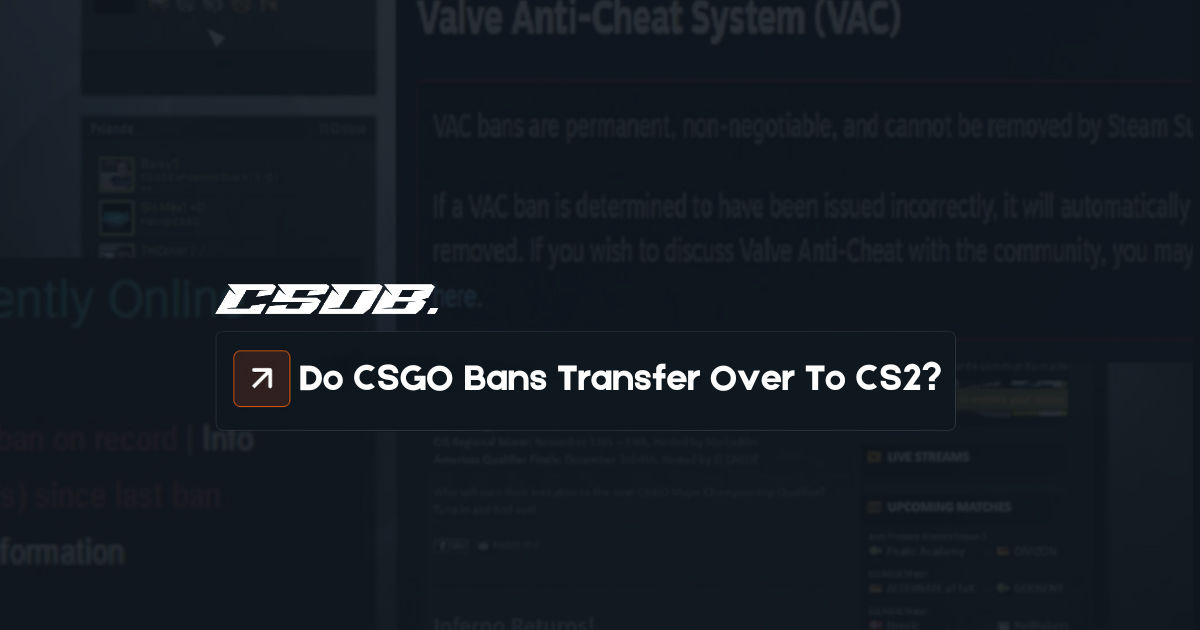BGREEN TV: Your Source for Green Innovations
Explore the latest trends and innovations in sustainable living, eco-friendly technology, and green entertainment.
VAC Ban Shenanigans: What Your Favorite Streamers Aren't Telling You
Discover the hidden truths behind VAC bans! Uncover what top streamers are keeping secret and join the debate now!
The Truth Behind VAC Bans: What You Need to Know
The VAC bans (Valve Anti-Cheat bans) are a crucial aspect of maintaining fair play within the gaming community, particularly in titles such as Counter-Strike and Dota 2. These bans are automatic and can affect your account permanently if you are found cheating or using cheats. One of the most important things to understand is that VAC bans are not issued lightly; Valve employs a sophisticated detection system that analyzes player behavior and software modifications. If a player is caught using any cheats or hacks that manipulate gameplay, a VAC ban is almost inevitable.
Players often wonder about the implications of a VAC ban on their game experience. Notably, a VAC ban affects only the games that utilize the VAC system. However, it prevents the affected player from joining VAC-secured servers, significantly limiting multiplayer options. If you're worried about the future of your gaming account, it's vital to stay informed and avoid any third-party software that could put your account at risk. A proactive approach to maintaining fair play will not only enhance your gaming experience but also protect your account from undesirable consequences.

Counter-Strike is a popular tactical first-person shooter that emphasizes teamwork and strategy. One of the widely used pistols in the game is the five seven, known for its high damage and accuracy. Players often rely on this weapon for its effectiveness in various combat scenarios.
Top Streamers Who Faced VAC Bans: Lessons Learned
The world of online gaming is not just about skill and strategy; it also involves adhering to strict regulations and fair play policies. VAC bans, or Valve Anti-Cheat bans, have a significant impact on both casual players and prominent streamers. Several top streamers have faced these bans, leading to a profound effect on their careers and followings. Notable examples include players like Shroud and summit1g, who encountered these bans due to perceived cheating or technical issues. Through these experiences, the gaming community has learned valuable lessons regarding the importance of integrity in gaming and the possible repercussions of violating game policies.
One of the key takeaways from the experiences of streamers facing VAC bans is the necessity of maintaining a strong code of conduct. Streamers often serve as role models for their followers, and their actions can significantly influence the gaming community. Moreover, transparency and accountability are crucial; streamers must communicate openly about any infractions and their path to redemption. This not only helps to rebuild trust with their audience but also reinforces the significance of ethical behavior in online gaming. Ultimately, the incidents involving top streamers serve as a reminder that the gaming world thrives on fairness and respect.
Are VAC Bans Really Just Bad Luck? An Inside Look
When it comes to VAC bans in games like Counter-Strike: Global Offensive, many players often wonder if these penalties stem from mere bad luck. In reality, the Valve Anti-Cheat system is designed to examine players’ behavior and detect cheating software. This complex algorithm doesn't leave much room for randomization. Players might find themselves at the wrong end of a ban not because they engaged in cheating, but rather due to false positives triggered by legitimate software or hardware configurations. It raises the question: how much of a role does chance play in these life-altering bans?
It is crucial to understand that while some players may attribute their VAC bans to luck, the underlying mechanisms are based on strict criteria set by Valve. Many have argued that the VAC system, despite its effectiveness in identifying cheaters, is not flawless. Instances of mistaken identities can occur when modding tools or even certain game configs trigger the anti-cheat software unintentionally. This brings to light the personal responsibility players have to ensure they don’t inadvertently cross any lines while enjoying their favorite games. So, should we really be blaming bad luck, or is it more about being informed and cautious?